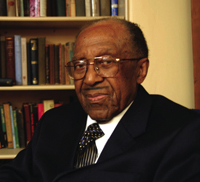History of Hymns: "Easter People, Raise Your Voices"
By C. Michael Hawn
"Easter People, Raise Your Voices"
William M. James
The United Methodist Hymnal, No. 304
 |
|
William M. James |
Easter people, raise your voices,
sounds of heaven in earth should ring.
Christ has brought us heaven's choices;
Heavenly music, let it ring.
Alleluia! Alleluia!
Easter people, let us sing.*
Following in the tradition of many pastors who write hymns, William Marceus James (1913-2013) wrote "Easter People, Raise Your Voices" for his congregation at Metropolitan Community United Methodist Church in New York City.
Born in Meadville, Mississippi, and educated at Mt. Beulah College, Butler University, and Drew University, the Rev. James received his license to preach in Lexington, Kentucky, in 1936 and was ordained a deacon in the South Indiana Conference in 1938. In 1940, he was ordained an elder in the New York Conference and appointed to East Calvary (Harlem) Methodist Church the same year. In 1944, he was appointed to the Trinity (Morrisania) Methodist Church in the Bronx, a church he founded with no members. In only eight years, it grew into a 900-member congregation. In an interview with the United Methodist Interpreter (May/June 2004), James noted, "It was during that time I learned to minister to gangs and street people."
In 1952 he began serving Community Methodist Church in Harlem, which later became the Metropolitan Community United Methodist Church in 1971. The Rev. James ministered to this congregation for 33 years until "retiring" in 1985, but he continued his ministry to young people and to the Harlem community. In an interview with Luonne Abram Rouse, Senior Minister to this congregation in 2004, Rouse said, "Dr. James is nearly ninety years old, and serves very actively as my assistant minister, with direct responsibilities for evangelism." He continues to be remembered as Pastor Emeritus.
The Rev. James was involved in many community ministries. He organized the East Harlem Triangle Housing Program, founded the Ministerial Interfaith Association of Harlem, and ministered to street gangs and the homeless. He was chairman of the board of the Harlem Urban Development Corporation that helped save the famed Apollo Theater from abandonment and rebuilt the structure of the Harlem community. After directing the Multi-Ethnic Center for Ministry of the northeastern jurisdiction of the United Methodist Church at Drew University, he was awarded an honorary doctorate from this institution in 1985.
The Rev. James' obituary in the New York Annual Conference (January 18, 2013) states, "He was a delegate to eight general and jurisdictional conferences, where he was a key leader in the struggle to end the Central Jurisdiction, the segregated jurisdiction of the Methodist Church. At the Conference level, Bill could always be counted on to fight for racial equality and to oppose war. He was also an early champion of gay and lesbian rights. Bill served on the board of the United Methodist City Society, a mission agency of the church in the metropolitan region for seventy years, where he helped shape the church’s response to the urban crisis."
The author of more than fifty hymns, James noted to this writer in 2005 that "I wrote hymns for my congregation whenever I needed one. 'Easter People' is not the greatest hymn I have, but it took better than the others. Most of my hymns have themes around the social gospel." Originally in five stanzas, the hymn first appeared in the United Methodist collection, Songs of Zion (1981), in its present form.
The first stanza seems to echo Charles Wesley's "Christ, the Lord, is risen today." Wesley states, "earth and heaven in chorus say." James proclaims, "sounds of heaven and earth should ring." The musical metaphor continues with Wesley – "Sing, ye heavens, and earth reply" – and James – "heavenly music, let it ring. . . Easter people, let us sing!" Both acknowledge the cosmic connection between heaven and earth. The Wesleyan connection is unmistakable in James' hymn.
Both hymns share "victory" language. Wesley, citing I Corinthians 15:55, asks, "Where's thy victory, boasting grave?" James sounds a battle cry at the end of stanza two, "On to victory now we go."
The triumph of the Resurrection over evil is the theme of "Easter People." In stanza two, the poet reminds us that the "fear of death" cannot stop us from doing all we can to overcome evil "here below." The final stanza insists: "Every day to [Christians] is Easter" because our God is one who "rights the wrong."
William James' ministry and his 97 years of life reflected his belief in the power of the Resurrection to make a difference in the lives of those whom he served.
*Words © 1979 The United Methodist Publishing House (Administered by The Copyright Company, Nashville, TN) All rights reserved. Used by permission.
Dr. Hawn is distinguished professor of church music at Perkins School of Theology. He is also director of the seminary's sacred music program.
Contact Us for Help
Contact Discipleship Ministries staff for additional guidance.
